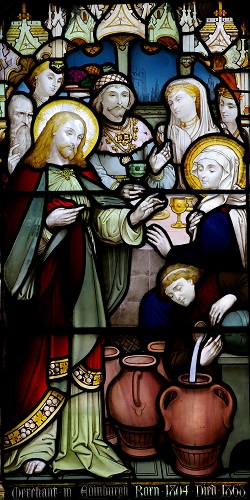 Last of three posts on the role of celebrations in our lives. I mentioned earlier, and perhaps many reading this post already know, that Jesus’ first recorded miracle occurs at a wedding celebration: “On the third day there was a wedding at Cana in Galilee, and the mother of Jesus was there. Jesus also was invited to the wedding with his disciples” (John 2:1-2 ESV). So, just to point out the obvious, Jesus and the disciples aren’t hermits; they aren’t cut off from society. They’re invited to this occasion. Jesus doesn’t rebuke anyone for spending all that money on a feast. He contributes to it, and in a high-quality way; the governor of the feast says, “Everyone serves the good wine first, and when people have drunk freely, then the poor wine. But you have kept the good wine until now” (v. 10). I mentioned in this previous post that my favorite part of the story is the idea that although the guests at the feast have no idea where this good wine came from, “the servants who had drawn the water knew.” If you’re quietly at work behind the scenes, making sure that everything gets done and goes smoothly, you can get a blessing that isn’t available to the oblivious partygoers. (So I made sure that the image to go with this post included one of those servants.)
Last of three posts on the role of celebrations in our lives. I mentioned earlier, and perhaps many reading this post already know, that Jesus’ first recorded miracle occurs at a wedding celebration: “On the third day there was a wedding at Cana in Galilee, and the mother of Jesus was there. Jesus also was invited to the wedding with his disciples” (John 2:1-2 ESV). So, just to point out the obvious, Jesus and the disciples aren’t hermits; they aren’t cut off from society. They’re invited to this occasion. Jesus doesn’t rebuke anyone for spending all that money on a feast. He contributes to it, and in a high-quality way; the governor of the feast says, “Everyone serves the good wine first, and when people have drunk freely, then the poor wine. But you have kept the good wine until now” (v. 10). I mentioned in this previous post that my favorite part of the story is the idea that although the guests at the feast have no idea where this good wine came from, “the servants who had drawn the water knew.” If you’re quietly at work behind the scenes, making sure that everything gets done and goes smoothly, you can get a blessing that isn’t available to the oblivious partygoers. (So I made sure that the image to go with this post included one of those servants.)
However, he immediately gets a feast ready, and I’m always a little tickled to note that, while he does indeed rush in to tell Sarah to make some bread, he’s the one who goes out to the herd, picks out a calf, “tender and good,” to be prepared, and who serves the men. He doesn’t foist it all off on Sarah. (Just a-sayin”, as I often say.) All through the Old Testament there are feasts that God commands Israel to observe. There’s no idea that these occasions are wasteful; they are part of remembering God’s blessings. One particularly striking passage occurs in Deuteronomy 14, in which commands are given concerning the tithes Israel was to pay. While at least some of those tithes went for the upkeep of the Levites, who didn’t have land of their own, they are also to be consumed with joy in a big feast: “whatever your appetite craves. And you shall eat there before the Lord your God and rejoice, you and your household” (v. 26).
Everyone’s familiar with the New Testament story of the Prodigal Son, who runs away from home, wastes his inheritance, and then “comes to himself” and realizes what a fool he’s been. What does his father do when the son returns? Puts on a big feast. The phrase “killed the fatted calf” comes from this story; in those times there was a prime animal kept in the herd who was fed a special diet to fatten it up. When a special occasion rolled around this animal would be slaughtered to form the main course. (I hope no one will think I’m being sacrilegious if I mention that there’s a 1973 Elton John song that includes the line, “We’ll kill the fatted calf tonight, so stick around.” I guess this citation proves my point that the expression is still in use in our modern world.)
In none of these biblical celebrations is there the slightest hint of ostentatiousness. It’s all done before God with a thankful heart. What a good yardstick for us as we finish out the year.
Very thoughtful article. I’ve been in many discussions about this through the years. I’ve come to the same conclusion. Look at all the feasts and celebrations in the Bible. I agree! One of the first things we’ll do in heaven is the Marriage Supper of the Lamb.